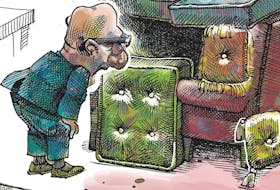In March, I attended an interesting session helmed by the Harris Centre of Memorial University (MUN) called ‘Come From Away and Stay.’

Shedding light on retention of immigrants in rural areas, the session unpacked why immigrants choose to ‘move to or stay in rural areas.’ Among other interesting statistics, one stood out to me. It said, 36 per cent of immigrants in Newfoundland and Labrador have been a victim of discrimination between 2011 and 2016. The percentage in Nova Scotia was slightly higher at 40.3 per cent. Prince Edward Island ranked the highest amongst the three at 43.9 per cent.
However, annual reports of the Human Rights Commission in N.L., N.S. and P.E.I. — an “independent at arm’s-length government agency that is responsible for promoting an understanding of, acceptance of, and compliance with the provisions of the Human Rights Act” — do not seem to reflect the above percentages and over the years have reported far fewer numbers on the grounds for discrimination due to race, colour, nationality, ethnic origin and religion bringing to the forefront a pertinent question: Do immigrants shy away from reporting discrimination?
The power equation
Although in the past, based on affordability, one could buy Canadian citizenship through programs like Federal Immigrant Investor Program (still continued in Quebec), most immigrants, historically, continue to migrate through harder routes, transitioning from students/workers/refugees to permanent residents and then citizens, which requires time and financial means. Programs such as the Express Entry and the Atlantic Immigration Pilot are aimed at easing this. However, what these or any other programs simply cannot do is enforce attitudes, throughout the population, that impact the understanding and reporting discriminatory acts.
During this period of transition, immigrants holding study permits, work permits, refugee status or permanent residency status can find themselves in vulnerable positions where they either witness discriminatory behaviours or are subjected to them, leading them to keep mum due to the fear of losing their status in the country, especially, considering that immigration is a socially, economically, emotionally and mentally challenging process. In addition to losing status in the country, an immigrant might feel physically and mentally unsafe addressing any form of discrimination — including within university environments, volunteer and work spaces — simply because their superior or a person in authority might be the perpetrator themselves.
Discrimination, racism and othering are like peas in a pod - annoying best friends that do everything together. And they can manifest anywhere, including in an immigrant’s ethnic community. Anecdotally, it has been reported that immigrants hear ‘This is how it is. Deal with it,’ or ‘If you report it, then they won’t hire any of us again,’ which results in the minimization of their experience and accentuates their fear of being ostracized from their ethnic community (which can be home away from home for many). Add to this, language barriers and an unsaid expectation of gratitude from the mainstream culture and suddenly, the discrepancy in the statistics starts to make sense.
What would you do?
Chief human rights commissioner of New Zealand, Paul Hunt, brought to light a pertinent point in the aftermath of the terrorist attacks in Christchurch.
“Casual racism can lead to all sorts of terrible stuff. Casual racism can lead to the stereotyping, and the stereotyping can lead to the othering … and as soon as you start treating others as alien it’s close to demonising, and demonising can slip into the 15th of March,” he told www.newsroom.co.nz,, urging people to “calmly and peacefully challenge individuals making racist comments.”
Standing up for oneself or for others takes enormous strength and courage. It is easy to ask people to call out hate, discrimination and bigotry but harder to walk the talk. Turning to resources such as the Human Rights Commission (in NL, NS and PEI) — which are approachable entities, trusting authorities, that treat every matter on hand with fairness — would be a safe step in the event one is witnessing or experiencing discrimination.
When such acts — blatant or through microaggressions — go unchallenged, we, collectively, pay a huge price in exchange for our silence. We, unintentionally, become responsible for innocent lives that are maimed physically, emotionally and mentally in the name of colour, religion and race.
So, the next time you witness or feel discrimination, call it out. That’s what I will be doing.
Sources:
- NL: https://thinkhumanrights.ca/education-and-resources/annual-reports/
- NS: https://humanrights.novascotia.ca/about/publications-reports-plans
- PEI: http://www.gov.pe.ca/humanrights/index.php3?number=72437&lang=E
RELATED: SaltWire Deep Dive - Employment After Immigration
Prajwala Dixit is an Indian-Canadian engineer, journalist and writer in St. John’s, N.L., who writes a monthly regional column for the SaltWire Network. When she isn't engineering ways to save the world, she can be found running behind her toddler, writing and volunteering. Follow her and reach her at @DixitPrajwala
MORE FROM DIXIT









